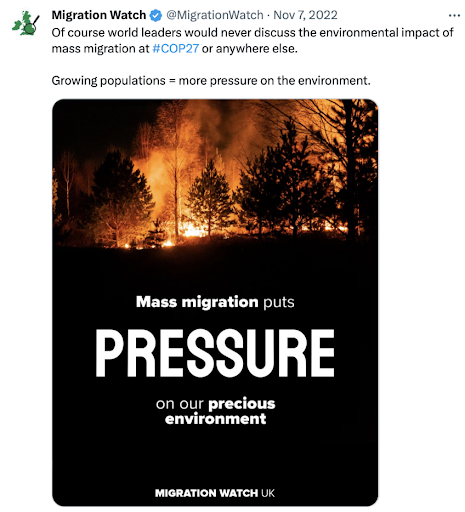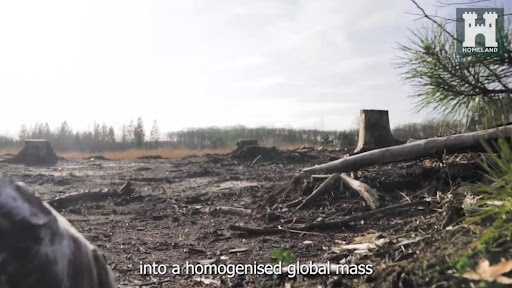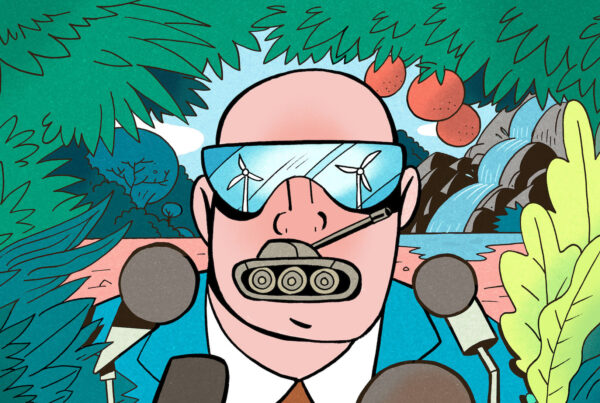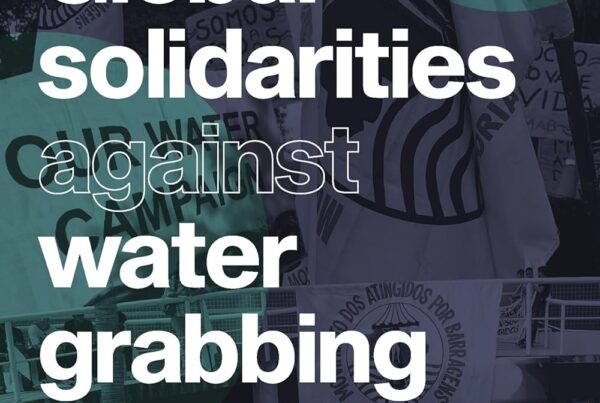Many far-right groups claim that migration drives environmental destruction, from river pollution to climate breakdown. These ‘ecobordering’ narratives greenwash racism and cover up the political and economic causes of ecocide.
As world leaders gathered at the COP26 climate summit in 2022, members of the fascist group Patriotic Alternative (PA) unveiled a banner declaring ‘Reduce immigration to reduce CO2’. The same day, the opaquely funded think tank Migration Watch UK posted an image of a forest fire hellscape emblazoned with the words, ‘Mass migration puts pressure on our precious environment’. These are just two examples of an emerging set of ‘ecobordering’ narratives which frame reducing – or eliminating – immigration as environmental protection.

Fascists declare that borders are climate action. Source: Patriotic Alternative via Telegram.
The far right sells racism as the solution to white people’s anxieties. If we want to develop up-to-date antifascist responses and avoid reproducing far-right narratives ourselves, we need to keep up with far-right storytelling. We also need to understand how mainstream discourse legitimises far-right issues. This article outlines how the British far right exploits ecological anxiety to push for harsher immigration policy. There are two main narratives: one claims that migration raises emissions and increases pressure on British nature; the other casts migrants as an invasive species threatening both British nature and the ‘indigenous’ population of white people. Both narratives are fed by the liberal mainstream.

Migration Watch UK illustrates ‘mass migration’ with climate disaster imagery. Source: Migration Watch UK via Twitter/X.
“The ravages of overpopulation”
The British far right often claims that migration threatens the environment via overpopulation. This narrative runs across the far-right spectrum. For example, the fascist Homeland Party takes a similar line to the radical right UK Independence Party (UKIP):
‘The most significant threat to the Green Belt, and the UK environment in general, especially England, is unsustainable population growth, which is predominantly fuelled by uncontrolled mass immigration’ (UKIP, 2020).
‘The environment in which we all live should be protected from the ravages of over-population, the new building projects, and pollution that goes with it’ (Homeland, 2023).
In their environmental policy, Homeland also holds migration responsible for water pollution: ‘When our sewage treatment plants cannot meet the demand of our rapidly increasing population, their only option is to release untreated sewage, causing great harm to our river ecosystems. This is unavoidable until the root cause, overpopulation driven by mass immigration, is dealt with.’

Homeland advertises ethnonationalism as ‘the REAL green solution’. Source: Homeland Party.
Although far-right groups generally apply this narrative to local environmental issues such as housebuilding, some also link migration to rising carbon emissions such PA’s banner shown in the first image. Identitarian group Local Matters and Migration Watch UK have both cited NGO Population Matters to claim that ‘our growing numbers are incompatible with our climate change commitments’. This, they reason, is because an individual’s carbon footprint will grow as they move from a poorer country to a richer country. Green Party candidate and Extinction Rebellion spokesperson Rupert Read voiced similar arguments in a deleted Ecologist article, although he does not advocate for tighter border controls.
These narratives obscure the underlying causes of environmental destruction – organising production and consumption around profit rather than wellbeing – whilst shifting the blame onto those least responsible. For example, English housing stock is already more than adequate for meeting needs and comfort if distributed more equally, but it is in the interests of homeowners as well as the financial and housebuilding sectors to maintain high housing demand through artificial scarcity. Meanwhile, the claim that overpopulation causes river sewage is extremely convenient for the privatised water companies which pocketed billions whilst leaving the infrastructure to crumble. In the case of climate change, ecobordering frames resource-intensive provisioning as inevitable and erases Britain’s responsibility for climate breakdown, instead blaming people who may very well be escaping its impacts.
“Protect our native species”
A second set of ecobordering narratives assumes a unique, spiritual connection between white British people and British nature. As Homeland writes, ‘Our people have an intrinsic bond with our homeland and are its natural stewards’. PA founder Mark Collett expands this idea in The Fall of Western Man, writing that ‘The strength and steel of the Western body was forged […] in the harsh frozen lands of Northern Europe’ through a process of ‘brutal natural selection’. As a result, ‘Blood and soil are the natural callings that must be at the centre of Western man’s mindset.’
The ecological undercurrents of this ‘blood and soil’ doctrine – popularised by the Nazis – present white British people as an indigenous species adapted to thrive in their ecosystem. Unlike overpopulation narratives, this position is mostly held by the ethnonationalist far right which believes that only those of a particular race can belong to a nation. For Homeland, ‘natural law’ dictates that ‘social harmony’ can only be achieved when each ‘ethnic group’ can ‘assert our unique cultural identity in our respective territories.’ Like the ethno-differentialists of the French New Right, Homeland claims to be ‘the true champion of diversity’, using strong borders to conserve a plurality of peoples and cultures.
According to this framework, fascists cast migrants as an ‘invasive species’ preventing the ‘native species’ from living peacefully – or even living at all. In the article ‘Ecocide’, PA writes:
‘By means of their NGOs, they have ferried invasive species across the Mediterranean […] Actions that have culminated in national governments spending billions to cement over bucolic landscapes in their rush to build accommodation for the “New Europeans” and tarmac over ancient woodlands to provide them with roads to aid their rapid access to social security offices, mosques and community centres where they can congregate and displace the indigenous species.’
Here, ‘they’ refers to Jewish billionaires George and Alex Soros, key characters in far-right conspiracy theories such as the ‘Great Replacement’. Replacement is a central mobilising issue amongst British fascists, with PA performing annual ‘White Lives Matter’ banner drops on Indigenous Peoples’ Day.
PA refracts this conspiracy through a blood and soil lens. As a result, the perceived destruction of British nature by migrants becomes inseparable from the eradication of white British people altogether. In one flyer PA alludes to this existential threat with a photo of the red squirrel, a symbolic British animal that has faced harsh competition from non-native grey squirrels. Meanwhile, Homeland illustrates the threat of ‘being subsumed into a homogenised global mass’ with footage of deforestation, underscoring the deep association between white extinction and environmental destruction.

Homeland illustrates the threat of race mixing. Source: Homeland Party.
Ecobordering and the mainstream
Across Europe, far-right groups are exploiting ecological crisis to push for further border violence. In Britain, they justify this by arguing that (a) migration will increase pressure on resources such as land and water, as well as raising emissions; and (b) migrants are an invasive species simultaneously threatening nature and the ‘indigenous’ population of white people. However, overpopulation narratives in particular may be more strategic than heartfelt. For example, PA urges politicians to ‘reduce immigration to reduce CO2’ whilst also warning of the ‘Climate Con’. Meanwhile, Migration Watch UK is part of a network of right-wing think tanks located in Tufton Street, including Britain’s foremost climate misinformation organisation, the Global Warming Policy Foundation.
Although these ideas are most common on the far right, they are closer to the mainstream than people may realise. For example, blaming migrants for placing unsustainable pressure on nature reproduces neo-Malthusian overpopulation narratives. These have enjoyed centuries of popularity and continue to be upheld by policymakers, NGOs, and TV presenters. Indeed, the president of Migration Watch UK is a former British ambassador, now sitting in the House of Lords. Mark Collett’s theory of climate-induced racial difference is purely colonial-era scientific racism. Meanwhile, Conservative politicians and newspaper columnists repeatedly describe migrants using the invasive species imagery of a ‘swarm’, an ‘invasion’, or ‘cockroaches’. But more fundamentally, in many ways the far right is only making explicit what is already implicit in government policy: that certain racialised groups present a threat that must be met with violence. By placing ecology downstream of borders the far right is mirroring the state’s own priorities.
On one level, then, ecobordering narratives can be countered by drawing attention to the large inequalities in environmental impacts driven by economic inequality, as well as the endless expansion of production and consumption required by capitalism. However, without challenging borders themselves, this approach can at best maintain border violence at business-as-usual levels. As ecobordering discourse gears up to legitimise this increasingly repressive bordering regime, it falls to antifascist and other liberatory movements to address the root causes of racist violence and ecological crisis.
Acknowledgements
Thank you to Lise Benoist, Miranda Iossifidis, Heather Luna, and Rohan Montgomery for their generous feedback.
Cable Collective is an antifascist research collective monitoring how ecological crisis is used to justify oppressive politics in the UK.




